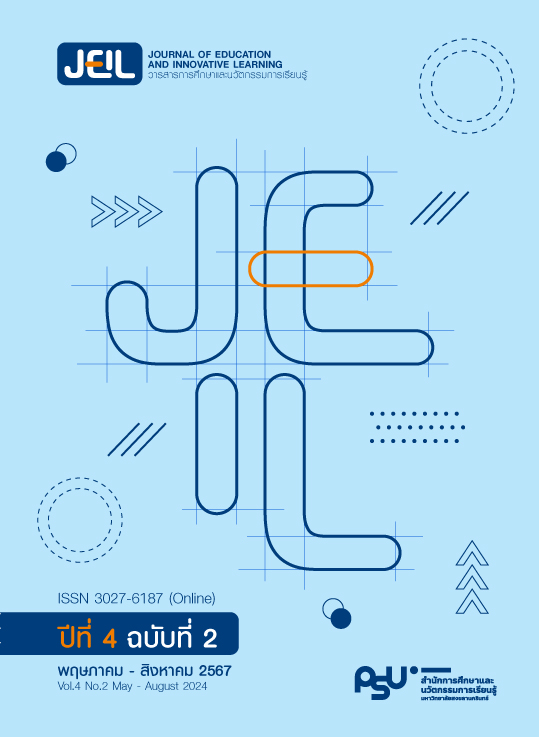กลยุทธ์การเรียนรู้ การอภิปราย และการตั้งคำถามแบบมีส่วนร่วม (Coop-Dis-Q): เทคนิคสอนการอ่านด้วยการทำงานเป็นทีม
Main Article Content
บทคัดย่อ
การอ่าน เป็นพื้นฐานของการเรียนรู้และความรู้ เป็นความสามารถที่มิได้เกิดขึ้นเองตามธรรมชาติ แต่ต้องอาศัยการเรียนรู้จากผู้อื่น การสอนอ่านมีความสำคัญต่อการพัฒนาการเรียนรู้ของมนุษย์เป็นอย่างมาก การพัฒนาผู้เรียนให้มีความฉลาดรู้ด้านการอ่าน เป็นกระบวนการที่ต้องอาศัยความรู้ทางศาสตร์การสอน โดยเฉพาะรูปแบบ วิธีการ หรือเทคนิคการสอนที่พัฒนาขึ้นอย่างเป็นระบบ กลยุทธ์การเรียนรู้ การอภิปราย และการตั้งคำถามแบบมีส่วนร่วม ในฐานะที่เป็นเทคนิคสอนการอ่านด้วยการทำงานเป็นทีม นับเป็นแนวทางหนึ่งที่น่าสนใจและน่าจะสร้างประโยชน์ในการจัดกิจกรรมการเรียนรู้ได้ โดยมีขั้นตอนการจัดการเรียนรู้ 5 ขั้น คือ 1) สร้างกลุ่ม 2) เตรียมชุดคำถาม 3) อภิปรายเรื่องราวเป็นกลุ่มและแบ่งคำถาม 4) อภิปรายไตรมิตร ตอบคำถาม และเพิ่มคำถาม และ 5) นำเสนอไตรมิตร อภิปรายคำตอบของกลุ่ม การจัดการเรียนรู้ตามขั้นตอนดังกล่าวจะช่วยส่งเสริมให้ผู้เรียนได้เรียนรู้ผ่านการเรียนรู้แบบร่วมมือ การอภิปราย และตอบคำถามร่วมกัน ซึ่งเทคนิคการสอนนี้สามารถนำไปพัฒนาการจัดการเรียนรู้ด้านการอ่านได้อย่างมีประสิทธิภาพ สอดคล้องกับจุดมุ่งหมายในการส่งเสริมให้ผู้เรียนเกิดสมรรถนะในศตวรรษที่ 21 โดยเฉพาะสมรรถนะด้านการสื่อสาร ด้านการทำงานแบบรวมพลังเป็นทีมและมีภาวะผู้นำ
Article Details

อนุญาตภายใต้เงื่อนไข Creative Commons Attribution-NonCommercial-NoDerivatives 4.0 International License.
เนื้อหาและข้อมูลในบทความที่ตีพิมพ์ในวารสารการศึกษาและนวัตกรรมการเรียนรู้ ถือเป็นข้อคิดเห็นและความรับผิดชอบของผู้เขียน ซึ่งกองบรรณาธิการวารสาร ไม่จำเป็นต้องเห็นด้วยหรือร่วมรับผิดชอบใด ๆ และไม่สงวนสิทธิ์การคัดลอกบทความเพื่อใช้ประโยชน์ทางวิชาการ แต่ให้อ้างอิงข้อมูลแสดงที่มาของบทความทุกครั้งที่นำไปใช้ประโยชน์
เอกสารอ้างอิง
Anggara, I. A., Saleh, M., & Sofwan, A. (2018). The Effectiveness of Coop-Dis-Q and Literature Circle Strategies in Teaching Reading Comprehension to Students with Different Personalities. English Education Journal, 8(1), 66-75. Retrieved from https://journal.unnes.ac.id/sju/eej/article/view/22135
Brown, C. S. (2014). Language and literacy development in the early years: Foundational skills that support emergent readers. Language and Literacy Spectrum, 24, 35-49.
Bureau of Academic Affairs and Education, Ministry of Education. (2019). A Manual for Teaching Reading and Analytical Thinking Towards Reading Development According to PISA Guidelines. Bangkok: Ministry of Education. Retrieved from https://pubhtml5.com/dcse/zvmk/basic/151-152 [in Thai]
Coopmans, M., & Kan, W. F. R. (2023). Facilitating citizenship-related classroom discussion: Teaching strategies in pre-vocational education that allow for variation in familiarity with discussion. Teaching and Teacher Education, 133, 104268. doi:10.1016/j.tate.2023.104268
Dankongrak, C. (2022). Manual for Building Competence in Teaching Reading of Elementary Level. Bangkok: Chulalongkorn University Press. [in Thai]
Gauthier, L. R. (2001). Coop-Dis-Q: A Reading Comprehension Strategy. Intervention in School and Clinic, 36(4), 217-220. doi:10.1177/105345120103600404
Gillies, R. M., Millis, B., & Davidson, N. (2023). Contemporary global perspectives on cooperative learning. New York: Routledge. doi:10.4324/9781003268192
Herman. (2014). The Effect of Using Coop-Dis-Q Strategy on Reading Comprehension of Narrative Text of The Second Year Students at Islamic Senior Boarding School Al- Kautsar Pekanbaru (Doctoral dissertation). Universitas Islam Negeri Sultan Syarif Kasim Riau, Indonesia. Retrieved from http://repository.uin-suska.ac.id/id/eprint/6263
Johnson, D. W., & Johnson, R. T. (2018). Cooperative Learning: The Foundation for Active Learning. In S. M. Brito (Ed.), Active Learning - Beyond the Future (59-71). IntechOpen. doi:10.5772/intechopen.81086
Lancaster, J. L. (2024). Daring to discuss: analyzing engagement and equality in high school discussions. Atlantic Journal of Communication, 32(1), 49-62. doi:10.1080/15456870.2022.2083137
Mogea, T. (2023). Improving Students’s Reading Comprehension Through Group Discussion Technique. Jurnal Pendidikan dan Sastra Inggris, 3(1), 91-102. doi:10.55606/jupensi.v3i1.1241
Pearson, P. D., & Cervetti, G. N. (2015). Fifty years of reading comprehension theory and practice. In P. D. Pearson and E. H. Hiebert (Eds.), Research-Based Practices for Teaching Common Core Literacy (1-24). New York, NY: Teachers College Press.
PISA Thailand. (2023). PISA 2022: Thailand Student Assessment Result. Retrieved from https://pisathailand.ipst.ac.th/news-21 [in Thai]
PISA Thailand. (2024). About PISA. Retrieved from https://pisathailand.ipst.ac.th/about-pisa [in Thai]
Richie, F. J. (2024). Teacher questioning as scaffolding: A study focusing on teacher-student interaction in ESL classroom in Taiwan (Master’s thesis). Fu Jen Catholic University, New Taipei City, Taiwan.
Rowe, K., & National Inquiry into the Teaching of Literacy (Australia). (2005). Teaching Reading: Report and Recommendations. Canberra, Australia: Department of Education, Science and Training. Retrieved from https://research.acer.edu.au/tll_misc/5
Salsabila, M. (2016). Using Cooperative Discussion Questioning (Coop-Dis-Q) Strategy Toward Narrative Reading to The Tenth Grade Students of Ma Al-Fatah Palembang (Doctoral dissertation). State Islamic University of Raden Fatah Palembang, Indonesia. Retrieved from http://eprints.radenfatah.ac.id/754/1/MIRRAH%20SALSABILA_TarPendBsing.pdf
Satthathanaphat, R. (2022). Introduction to Reading. Bangkok, Thailand: Ramkhamhaeng University Press. [in Thai]
Spencer, H. (2018). The Use of Coop-Dis-Q Strategy in Teaching Reading Analytical Exposition to The Eleventh Graders of Sma Negeri 1 Teluk Gelam. Language and Education Journal, 3(2), 36-46. Retrieved from https://ejournal.uniski.ac.id/index.php/LEJ/article/view/43
Tamimy, M., Rashidi, N., & Koh, J. H. L. (2023). The use of cooperative learning in English as foreign language classes: The prevalence, fidelity, and challenges. Teaching and Teacher Education, 121, 103915. doi:10.1016/j.tate.2022.103915
Tongaht, C. (2018). Thai Language Learning Management Using 21st Century Competencies-based. Journal of Education Studies, 46(1), 171-184. Retrieved from https://so02.tci-thaijo.org/index.php/EDUCU/article/view/113659 [in Thai]
Walidaini, L., Mujiyanto, J., & Warsono, W. (2021). The effectiveness of collaborative strategic reading (CSR) and cooperative-discussion-question (Coop-Dis-Q) in teaching reading comprehension. English Education Journal, 11(3), 325-333. doi:10.15294/eej.v11i1.44439


